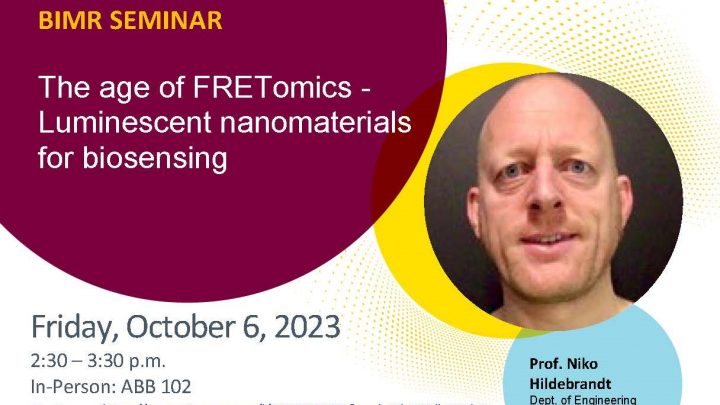The age of FRETomics – Luminescent nanomaterials for biosensing
Oct 6, 2023
2:30PM to 3:30PM

Date/Time
Date(s) - 06/10/2023
2:30 pm - 3:30 pm
Categories
Prof. Niko Hildebrandt
Dept. of Engineering Physics, McMaster University
The investigation of biomolecular recognition via Förster Resonance Energy Transfer (FRET) plays an important role for quantifying concentrations and distances in many fields of the life sciences. Application of lanthanide-based photoluminescence spectroscopy and microscopy for the analysis of FRET offers several advantages concerning versatility, sensitivity, and specificity. Lanthanide FRET donors can be molecular (e.g., lanthanide complexes) or nanoparticular (e.g., upconversion nanoparticles) and their FRET acceptor counterparts provide the same nanomolecular flexibility (e.g., quantum dots, dyes, fluorescent proteins). Adding the broad choice of biological recognition molecules, including antibodies, artificial protein binders, aptamers, nucleic acids, or peptides to the FRETomics toolbox provides a boundless source for designing fluorescent probes for biosensing and bioimaging. The presentation will explain time-resolved and time-gated FRET and the specific benefits for spectral and temporal luminescence multiplexing with different materials and instruments. Then, recent applications of multiplexed FRET biosensing and bioimaging with hybrid lanthanide-nanomaterials in solution, in-vitro, in-situ, and in-vivo will be discussed.
Bio:
Niko Hildebrandt is Full Professor in the Department of Engineering Physics at McMaster University (Hamilton, Canada). He holds a diploma in Medical Physics (2001, Technical University of Applied Sciences Berlin, Germany) and a Ph.D. in Physical Chemistry, which he obtained in 2007 at the University of Potsdam (Germany) under the supervision of Professor Hans-Gerd Löhmannsröben. Dr. Hildebrandt was group leader at the Fraunhofer Institute for Applied Polymer Research (2008 to 2010, Potsdam, Germany), the Institute for Fundamental Electronics (2010 to 2016, Orsay, France), the Institute for Integrative Biology of the Cell (2016 to 2019, Orsay, France), and the COBRA Laboratory (2019 to 2023, Rouen, France). He was Full Professor at Université Paris Saclay (France, 2010 to 2022) and Université de Rouen Normandie (France, 2022 to 2023), member of the Institut Universitaire de France (2014 to 2019), and Visiting Research Professor at Seoul National University (South Korea, 2021 to 2023).
Dr. Hildebrandt’s main research interest is time-resolved photoluminescence spectroscopy and microscopy and the application of lanthanides and nanomaterials for multiplexed Förster resonance energy transfer (FRET) biosensing and bioimaging. He has supervised 18 postdocs and 19 PhD students, co-authored 130 scientific papers, 9 book chapters, and 8 patents, is member of the permanent steering committee of the UPCON conference series (upcon.community) and the advisory board of the FRET community (fret.community), and serves on the editorial boards of Microchimica Acta (Springer Nature), Methods and Applications in Fluorescence (IOP Publishing), and Analysis & Sensing (Wiley – ChemPubSoc Europe). In 2023 he received the Advances in Measurement Science Lectureship Award from the American Chemical Society.
In-Person: ABB 102
Online: https://mcmaster.zoom.us/j/91849868270?pwd=Wlp0RDlhVWdHVEluMSsxSWxCN0hZQT09

